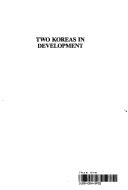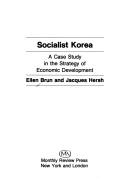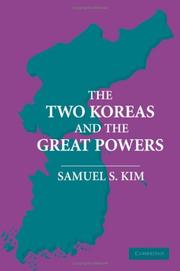| Listing 1 - 10 of 30 | << page >> |
Sort by
|

ISBN: 0887384374 Year: 1992 Publisher: New Brunswick ; London Transaction Publishers
Abstract | Keywords | Export | Availability | Bookmark
 Loading...
Loading...Choose an application
- Reference Manager
- EndNote
- RefWorks (Direct export to RefWorks)
Economic order --- South Korea --- North Korea --- Korea [North ] --- Economic conditions --- Social conditions --- Korea [South ] --- Economic development --- Capitalism --- Communism --- Korea (North) - Economic conditions. --- Korea (North) - Social conditions. --- Korea (South) - Economic conditions. --- Korea (South) - Social conditions. --- Economic development. --- Capitalism. --- Communism.
Book
ISBN: 9780190060367 0190060360 Year: 2020 Publisher: New York, N.Y. Oxford University Press
Abstract | Keywords | Export | Availability | Bookmark
 Loading...
Loading...Choose an application
- Reference Manager
- EndNote
- RefWorks (Direct export to RefWorks)
In September 2017, North Korea shocked the world by exploding the most powerful nuclear device tested anywhere in 25 years. Months earlier, it had conducted the first test flight of a missile capable of ranging much of the United States. By the end of that year, Kim Jong Un, the reclusive state's ruler, declared that his nuclear deterrent was complete. Today, North Korea's nuclear weapons stockpile and ballistic missile arsenal continues to grow, presenting one of the most serious challenges to international security to date. Internal regime propaganda has called North Korea's nuclear forces the country's 'treasured sword,' underscoring the cherished place of these weapons in national strategy. Fiercely committed to self-reliance, Kim remains determined to avoid unilateral disarmament. This book tells the story of how North Korea, once derided in the 1970s as a 'fourth-rate pipsqueak' of a country by President Richard Nixon, came to credibly threaten the American homeland by November 2017. The author explores the contours of North Korea's nuclear capabilities, the developmental history of its weapons programs, and the prospects for disarming or constraining Kim's arsenal. With no signs that North Korea's total disarmament is imminent over the next years, or even decade, he explores the consequences of a nuclear-armed North Korea for the United States, South Korea, and the world.
Polemology --- North Korea --- Kim, Chŏng-ŭn, --- Jong-un, Kim --- NUCLEAR WEAPONS--GOVERNMENT POLICY--KOREA (NORTH) --- Nuclear weapons --- Korea, North --- United States --- Politics and government --- Relations --- Korea (North) --- Politics and government.
Book
ISSN: 19445571 ISBN: 9780415670838 0415670837 Year: 2011 Volume: 418-419 Publisher: London: International institute for strategic studies,
Abstract | Keywords | Export | Availability | Bookmark
 Loading...
Loading...Choose an application
- Reference Manager
- EndNote
- RefWorks (Direct export to RefWorks)
Polemology --- North Korea --- Nuclear weapons --- National security --- Armes nucléaires --- Sécurité nationale --- Government policy --- Politique gouvernementale --- Korea (North) --- Corée du Nord --- Military policy --- Politique militaire --- Security, International --- Foreign relations --- Politics and government --- Nuclear weaponsKorea (North) --- Korea (North)Military policy --- Armes nucléaires --- Sécurité nationale --- Corée du Nord --- Nuclear weapons - Korea (North) --- Korea (North) - Military policy --- Korea (North) - Foreign relations --- Korea (North) - Politics and government
Book
ISBN: 9789045026534 Year: 2014 Publisher: Antwerpen Amsterdam Atlas Contact
Abstract | Keywords | Export | Availability | Bookmark
 Loading...
Loading...Choose an application
- Reference Manager
- EndNote
- RefWorks (Direct export to RefWorks)
Regional documentation --- North Korea --- Peixoto, José Luís --- Travel --- Korea [North ] --- Description and travel

ISBN: 0853453861 Year: 1976 Publisher: New York Monthly Review Press
Abstract | Keywords | Export | Availability | Bookmark
 Loading...
Loading...Choose an application
- Reference Manager
- EndNote
- RefWorks (Direct export to RefWorks)
Economic conditions. Economic development --- North Korea --- Socialism --- -Marxism --- Social democracy --- Socialist movements --- Collectivism --- Anarchism --- Communism --- Critical theory --- Korea (North) --- -Korea (North) --- -Economic conditions --- Economic policy --- -Economic conditions. --- Economic policy. --- Economic conditions.
Book
ISBN: 9780197575352 0197575358 Year: 2022 Publisher: New York, N.Y. Oxford University Press
Abstract | Keywords | Export | Availability | Bookmark
 Loading...
Loading...Choose an application
- Reference Manager
- EndNote
- RefWorks (Direct export to RefWorks)
Political systems --- History as a science --- Russia --- China --- North Korea --- Memory --- World War, 1939-1945 --- Russia (Federation) --- Korea (North)
Book
ISBN: 9788984213357 Year: 2012 Publisher: Seoul Kyungnam University Press
Abstract | Keywords | Export | Availability | Bookmark
 Loading...
Loading...Choose an application
- Reference Manager
- EndNote
- RefWorks (Direct export to RefWorks)
"North Korea's development of weapons of mass destruction has not only affected regional security, but also caused considerable anxiety at the global level. The authors of Nuclear North Korea explore the whats, whys and hows of the DPRK's nuclear program and offers fresh ideas on how to contain the country's nuclear ambitions."--P. [4] of cover.
National security --- Nuclear arms control --- Nuclear weapons --- K9578.15 --- Nuclear weapons control --- Arms control --- Korea: Defense and military -- weaponry -- North Korea --- Korea (North) --- History. --- Polemology --- North Korea
Multi
ISBN: 9780231536325 9780231161367 Year: 2014 Publisher: New York, N.Y. Columbia University Press
Abstract | Keywords | Export | Availability | Bookmark
 Loading...
Loading...Choose an application
- Reference Manager
- EndNote
- RefWorks (Direct export to RefWorks)
Political sociology --- Politics --- Democratization --- Korean reunification question (1945- ) --- Kwangju Uprising, Kwangju-si, Korea, 1980 --- History --- Political aspects --- Korea (North) --- Korea (South) --- Foreign relations --- Politics and government.

ISBN: 9780521660631 9780521668996 9780511510496 0511220669 0511218907 9780511218903 0521660637 0521668999 9780511220913 051122091X 9780511220661 051121958X 9780511219580 1280515945 9781280515941 0511510497 0521660637 110715782X 0511316992 Year: 2006 Publisher: Cambridge: Cambridge university press,
Abstract | Keywords | Export | Availability | Bookmark
 Loading...
Loading...Choose an application
- Reference Manager
- EndNote
- RefWorks (Direct export to RefWorks)
This book explores Korea's place in terms of multiple levels and domains of interaction pertaining to foreign-policy behaviors and relations with the four regional/global powers (China, Russia, Japan, and the United States). The synergy of global transformations has now brought to an end Korea's proverbial identity and role as the helpless shrimp among whales, and both North Korea and South Korea have taken on new roles in the process of redefining and projecting their national identities. Synthetic national identity theory offers a useful perspective on change and continuity in Korea's turbulent relationships with the great powers over the years. Following a review of Korean diplomatic history and competing theoretical approaches, along with a synthetic national-identity theory as an alternative approach, one chapter each is devoted to how Korea relates to the four powers in turn, and the book concludes with a consideration of inter-Korean relations and potential reunification.
International relations. Foreign policy --- History of Asia --- North Korea --- South Korea --- World politics --- Korea (South) --- Korea (North) --- United States --- East Asia --- Politics and government. --- Foreign relations --- Foreign relations. --- Politics and government --- Social Sciences --- Political Science --- Korea (South) - Politics and government --- Korea (North) - Politics and government --- United States - Foreign relations - 21st century --- East Asia - Foreign relations
Book
ISBN: 9782377011568 237701156X Year: 2023 Publisher: Paris Hémisphères éditions
Abstract | Keywords | Export | Availability | Bookmark
 Loading...
Loading...Choose an application
- Reference Manager
- EndNote
- RefWorks (Direct export to RefWorks)
« L’objet que je me propose d’explorer, écrivait Patrick Maurus à la parution, voici cinq ans, de la première édition du présent ouvrage, se manifeste par une évidence – la Corée est divisée – immédiatement suivie par une sorte de programme politique qui s’impose à tous, héritier de cette évidence indiscutée : il faudra bien finir par trouver un moyen de la réunifier. » Or, voici que l’Histoire s’accélère, sur fond d’accroissement des tensions dans cette partie du globe, de profond remaniement géopolitique à l’échelle mondiale, de menaces nucléaires multipartites et de pluie de missiles nord-coréens tirés en direction du voisin japonais... Compléter et actualiser l’analyse des « Trois Corées » s’imposait. Voici donc un outil précis et vivant pour mieux comprendre une région du monde sous les feux de l’actualité, analysée par l’un de ses meilleurs connaisseurs, dans une perspective originale, dégagée de la traditionnelle et simplificatrice opposition Corée du Nord/Corée du Sud et élargie à l’histoire régionale et mondiale.
Partitions territoriales --- Sphères d'influence --- Politique et gouvernement --- Divisions politiques et administratives --- Corée --- Histoire --- Group identity --- Korea --- Korea (South) --- Korea (North) --- History --- Civilization --- Politics and government. --- History. --- International relations. Foreign policy --- China --- North Korea --- South Korea
| Listing 1 - 10 of 30 | << page >> |
Sort by
|

 Search
Search Feedback
Feedback About UniCat
About UniCat  Help
Help News
News